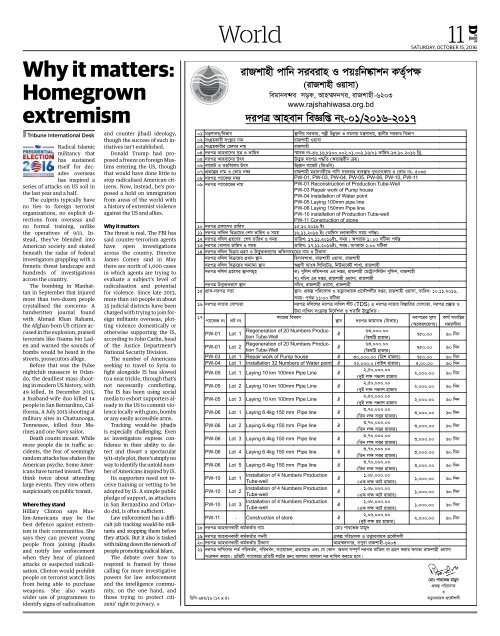DT e-Paper, Saturday, October 15, 2016
You also want an ePaper? Increase the reach of your titles
YUMPU automatically turns print PDFs into web optimized ePapers that Google loves.
Why it matters:<br />
Homegrown<br />
extremism<br />
• Tribune International Desk<br />
Radical Islamic<br />
militancy that<br />
has sustained<br />
itself for decades<br />
overseas<br />
has inspired a<br />
series of attacks on US soil in<br />
the last year and a half.<br />
The culprits typically have<br />
no ties to foreign terrorist<br />
organizations, no explicit directions<br />
from overseas and<br />
no formal training, unlike<br />
the operatives of 9/11. Instead,<br />
they’ve blended into<br />
American society and skated<br />
beneath the radar of federal<br />
investigators grappling with a<br />
frenetic threat landscape and<br />
hundreds of investigations<br />
across the country.<br />
The bombing in Manhattan<br />
in September that injured<br />
more than two-dozen people<br />
crystallised the concerns- A<br />
handwritten journal found<br />
with Ahmad Khan Rahami,<br />
the Afghan-born US citizen accused<br />
in the explosion, praised<br />
terrorists like Osama bin Laden<br />
and warned the sounds of<br />
bombs would be heard in the<br />
streets, prosecutors allege.<br />
Before that was the Pulse<br />
nightclub massacre in Orlando,<br />
the deadliest mass shooting<br />
in modern US history, with<br />
49 killed. In December 20<strong>15</strong>,<br />
a husband-wife duo killed 14<br />
people in San Bernardino, California.<br />
A July 20<strong>15</strong> shooting at<br />
military sites in Chattanooga,<br />
Tennessee, killed four Marines<br />
and one Navy sailor.<br />
Death counts mount. While<br />
more people die in traffic accidents,<br />
the fear of seemingly<br />
random attacks has shaken the<br />
American psyche. Some Americans<br />
have turned inward. They<br />
think twice about attending<br />
large events. They view others<br />
suspiciously on public transit.<br />
Where they stand<br />
Hillary Clinton says Muslim-Americans<br />
may be the<br />
best defence against extremism<br />
in their communities. She<br />
says they can prevent young<br />
people from joining jihadis<br />
and notify law enforcement<br />
when they hear of planned<br />
attacks or suspected radicalisation.<br />
Clinton would prohibit<br />
people on terrorist watch lists<br />
from being able to purchase<br />
weapons. She also wants<br />
wider use of programmes to<br />
identify signs of radicalisation<br />
and counter jihadi ideology,<br />
though the success of such initiatives<br />
isn’t established.<br />
Donald Trump had proposed<br />
a freeze on foreign Muslims<br />
entering the US, though<br />
that would have done little to<br />
stop radicalised American citizens.<br />
Now, instead, he’s proposed<br />
a hold on immigration<br />
from areas of the world with<br />
a history of extremist violence<br />
against the US and allies.<br />
Why it matters<br />
The threat is real. The FBI has<br />
said counter-terrorism agents<br />
have open investigations<br />
across the country. Director<br />
James Comey said in May<br />
there are north of 1,000 cases<br />
in which agents are trying to<br />
evaluate a subject’s level of<br />
radicalisation and potential<br />
for violence. Since late 2013,<br />
more than 110 people in about<br />
35 judicial districts have been<br />
charged with trying to join foreign<br />
militants overseas, plotting<br />
violence domestically or<br />
otherwise supporting the IS,<br />
according to John Carlin, head<br />
of the Justice Department’s<br />
National Security Division.<br />
The number of Americans<br />
seeking to travel to Syria to<br />
fight alongside IS has slowed<br />
to a near trickle, through that’s<br />
not necessarily comforting.<br />
The IS has been using social<br />
media to exhort supporters already<br />
in the US to commit violence<br />
locally with guns, bombs<br />
or any easily accessible arms.<br />
Tracking would-be jihadis<br />
is especially challenging. Even<br />
as investigators express confidence<br />
in their ability to detect<br />
and thwart a spectacular<br />
9/11-style plot, there’s simply no<br />
way to identify the untold number<br />
of Americans inspired by IS.<br />
Its supporters need not receive<br />
training or vetting to be<br />
adopted by IS. A simple public<br />
pledge of support, as attackers<br />
in San Bernardino and Orlando<br />
did, is often sufficient.<br />
Law enforcement has a difficult<br />
job tracking would-be militants<br />
and stopping them before<br />
they attack. But it also is tasked<br />
with taking down the network of<br />
people promoting radical Islam.<br />
The debate over how to<br />
respond is framed by those<br />
calling for more investigative<br />
powers for law enforcement<br />
and the intelligence community,<br />
on the one hand, and<br />
those trying to protect citizens’<br />
right to privacy. •<br />
World<br />
11<br />
SATURDAY, OCTOBER <strong>15</strong>, <strong>2016</strong><br />
<strong>DT</strong>


















